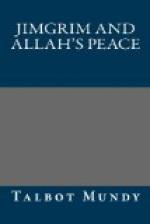He pointed. A cherry-red fire with golden sparks and crimson-bellied sulphur smoke was blazing in the midst of El-Kerak.
“The home of Abdul Ali of Damascus,” said Anazeh with pride in his voice. It was the pride of a man who shows off the behaviour of his children. “My men did it!”
“How can they escape?” Grim asked him.
“Wallah! Will the gate guards stand idle? Will they not run to the fire—and to the looting? But they will find not much loot. My men already have it!”
“Loot,” said Grim, “will delay them.”
“Money doesn’t weigh much,” Anazeh answered. “Here my men come.”
Somebody was coming. There came a burst of shooting and yelling from somewhere between us and El-Kerak, and a moment later the thunder of horses galloping full-pelt. Anazeh got down to the road with the agility of a youngster, ordered Abdul Ali of Damascus, the shivering Ahmed and me under cover. He placed his remaining handful of men at points of vantage where they could cover the retreat of the fifteen. And it was well he did.
There were at least two score in hot pursuit, and though you could hardly tell which was which in that dim light, Anazeh’s party opened fire on the pursuers and let the fifteen through. I did not get sight of Grim while that excitement lasted, but he had two automatics. He took from me the one that I had taken from Abdul Ali, and with that one and his own he made a din like a machine-gun. He told me afterward that he had fired in the air.
“Noise is as good as knock-outs in the dark,” he explained, while Anazeh’s men boasted to one another of the straight shooting that it may be they really believed they had done. An Arab can believe anything—afterward. I don’t believe one man was killed, though several were hit.
At any rate, whether the noise accomplished it or not, the pursuers drew off, and we went forward, carrying a cashbox now, of which Abdul Ali was politely requested to produce the key. That was the first intimation he had that his house had been looted. He threw his bunch of keys away into the shadows, in the first exhibition of real weakness he had shown that night. It was a silly gesture. It only angered his captors. It saved him nothing.
Four more of Anazeh’s men had been wounded, all from behind, two of them rather badly, making six in all who were now unfit for further action. But we did not wait to bandage them. They affected to make light of their injuries, saying they would go over to the British and get attended to in hospital. Abdul Ali was put on Ahmed’s miserable mount, with his legs lashed under the horse’s belly. Ahmed, with Mahommed ben Hamza and his men were sent along ahead; being unarmed, unmounted, they were a liability now. But those Hebron thieves could talk like an army; they put up a prodigious bleat, all night long, about that cash-box. They maintained they had a clear right to share its contents, since unless they had first captured Abdul Ali, Anazeh’s men could not have burned his house and seized his money. Anazeh’s men, when they had time to be, were suitably amused.




